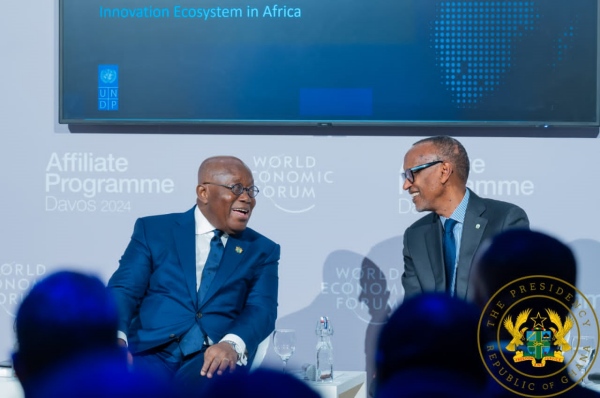The President of the Republic, Nana Addo Dankwa Akufo-Addo, is confident that attracting private funding, particularly those that finance risky yet innovative endeavours, is essential to ensuring that Africa attains her development objectives.
He also holds the fervent belief that, this path can be sought for and charted, alongside all other necessary concurrent efforts to protect the futures of respective African economies.
President Akufo-Addo was addressing Heads of States and the international business community at the Timbuktoo: Unleashing Africa’s Startup Revolution, organised on the sidelines of the World Economic Forum, in Davos Switzerland, on Tuesday, 16th January, 2023.
The innovative, private-focused Timbuktoo undertaking, is a bold and unique approach to solve the current gap in early-stage risk capital and to better integrate African innovation players from universities to corporates to investors, and to enable start-ups to seize the African market opportunity.
It seeks to galvanize Africa’s tech and tech-enabled start-ups, and aims to birth over a thousand start-ups with a significant scale and impact in excess of a hundred million livelihoods. This in turn, will generate a ten-fold return, amounting to more than ten billion dollars, in terms of wealth and value creation for Africa’s economies.
Speaking on the nexus between finance, entrepreneurship, technology, and youth empowerment, President Akufo-Addo said, “2023 was the year African economies consolidated their recovery and demonstrated resilience and adaptability while navigating an uncertain global environment,” after bracing with obvious bruises, the turbulences that heralded the beginning of the 2020s.
Stating the stats, he disclosed that, the average growth on the African continent, which was estimated at 3.8% in 2022, stabilised at 4.1% in 2023, and is forecasted to reach 4.3% in 2024.
Citing the case of Ghana as having “turned the corner”, and looking “forward to attaining a more resilient, transformed economy”, he said, “economic growth has rebounded, with an average GDP of 3.2% for the first nine months of 2023, compared to 2.9% within the same period in 2022, the exchange rate is more stable, and interest rates are softening.”
Whilst recognising the many challenges needed to be scaled to unlock the continent’s potential, he was happy to state that, “most countries on the continent are certainly moving in the right direction.”
“Indeed, for many African leaders, our foremost challenge now, and over the short term, is to ensure that we put in place the right structures to enable young Africans create innovative and compelling businesses that can contribute significantly to job creation and sustainable economic growth,” he said.
With such focus on job creation, primarily due to Africa’s 1.3 billion people, which is expected to double up to 2.5 billion by 2050, President Akufo-Addo added that, “Africa has the youngest population in the world, according to the U.N., with some sixty percent of the population under the age of twenty-five.”
President Akufo-Addo said with this exciting growth potential already enticing entrepreneurs and investors into the continent, it has been driven by a combination of factors including low market penetration, as well as a variety of industries which remain underserved.
“According to the African Venture Capital Association, African start-ups have been on an upward fundraising trend in the past few years. Indeed, the average annual growth rate in the value of venture capital deals, for instance, was over one hundred percent between 2017 and 2019.”
He added that, as of 2022, Africa raised US$5.2 billion in venture capital across 786 deals, representing three percent of the total volume, 1.2% of the total value of global venture funding in 2022.
He also mentioned Africa as being the only region outside of Europe to witness positive year-on-year growth that quarter, with venture capital funding to Africa throughout 2023 consistently outpacing South America, the continent’s whose socio-economic indices are closest to us in Africa.
Contextually, “Africa raised US$2.9 billion between the first and third quarters of 2023, compared to US$1.6 billion for Latin America within the same timeframe”, he disclosed.
He said the ravaging effects of COVID, has left Sub-Saharan Africa alone in need of some US$574 billion annually, until 2030 to finance the Sustainable Development Goals (SDGs).
In lieu of this, he concluded on the conviction that, private sector investments will play a significant role in our post-COVID bounce back, just as alternative financing instruments, such as equity investments, as well as the “channelling some of the inbound public and private investment flows toward sectors such as fintech, information technology, and green manufacturing, leading to Africa’s economic recovery and transformation.”

